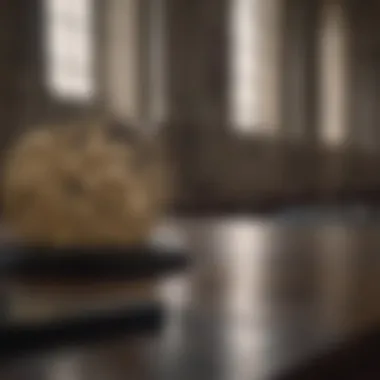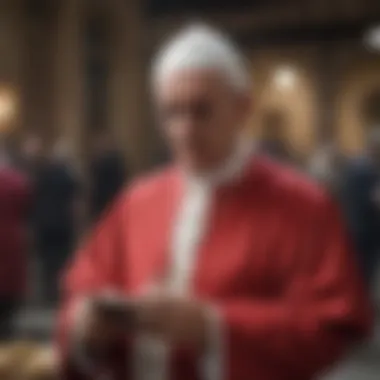Understanding the Pontifical Catholic University


Intro
The Pontifical Catholic University represents a vital institution within the realm of higher education, where tradition intertwines with modern academic pursuits. Rooted in a rich historical past, the university not only shapes future generations of scholars but also plays a pivotal role in the global intellectual community. Through its focus on theology, philosophy, and social sciences, the university aims to contribute meaningful insights to contemporary societal challenges.
Research Highlights
Key Findings
Through a comprehensive examination of the university's objectives and achievements, several key findings emerge:
- The university emphasizes a holistic approach to education, integrating faith with reason.
- Contributions to social sciences are significant, influencing policies and practices.
- Research output is diverse, covering various disciplines and international collaborations.
- There is a strong commitment to student engagement, fostering critical thinking and ethical reasoning.
These findings emphasize the university’s central position in academia and its broader impact on society.
Implications and Applications
The implications of the research findings are profound. The Pontifical Catholic University serves as a model for how institutions can balance tradition with contemporary educational needs. By adhering to its philosophical roots while embracing innovation, the university supports a multifaceted educational experience. The applications of its research span across various fields:
- Theological research contributes to interfaith dialogues and understanding.
- Philosophy fosters critical discussions that challenge social norms.
- The social sciences inform community initiatives and public policy.
These applications highlight the university's relevance in a fast-changing world, where critical thought and ethical considerations are paramount.
Methodology Overview
Research Design
To understand the university’s influence, a mixed-methods approach was adopted. Quantitative data provided metrics on student performance and research output, while qualitative interviews offered insights into the student and faculty experiences.
Experimental Procedures
Research involved:
- Gathering data from academic publications and institutional reports.
- Conducting surveys among students and faculty to assess engagement levels.
- Analyzing the effects of curricular changes on student outcomes.
This methodology ensured a comprehensive investigation of the university's operations and contributions.
Closure
The exploration of the Pontifical Catholic University reveals its unique blend of historical significance and contemporary relevance. Its commitment to education and societal contributions marks it as a significant institution, influencing both academic discourse and real-world applications. By continually adapting to new challenges, the university remains a cornerstone of higher learning.
Prelims to the Pontifical Catholic University
The Pontifical Catholic University is a significant institution in higher education. Its influence spans across various fields, particularly in theology, philosophy, and social sciences. Understanding its history and mission is crucial for recognizing its role in shaping academic and moral thought. This section provides a detailed look into its historical context and founding principles, setting the foundation for exploring its current contributions.
Historical Context
The roots of the Pontifical Catholic University can be traced back to a complex tapestry of cultural and religious developments. Established during a time when the Catholic Church sought to strengthen its educational institutions, the university represents a response to global changes. Situations such as the Reformation and the Enlightenment played pivotal roles in its formation. The advent of modernity necessitated a re-examination of how faith interacts with reason and science.
The first pontifical universities emerged in Europe, especially during the Middle Ages, serving as centers of theological training and scholarly inquiry. By emphasizing a synthesis of faith and intellect, these institutions contributed immensely to the development of educational methods that persist today.
"The Pontifical Catholic University stands at the intersection of tradition and modernity, navigating challenges while honoring its historical legacy."


Its establishment marked a commitment to adapt to societal needs while remaining firmly anchored in Catholic doctrine. Understanding this legacy is essential as it anchors the university's current mission and contributions.
Founding Principles and Mission
The founding principles of the Pontifical Catholic University are rooted in the mission to cultivate knowledge alongside spiritual development. The university aims to foster an environment where academic exploration coexists with ethical and moral frameworks dictated by Catholic teaching.
The mission includes several core elements:
- Promotion of Faith and Reason: The university encourages students to pursue truth in both academic inquiry and personal faith.
- Service to Society: There is a strong emphasis on community engagement and social responsibility, urging students to utilize their education for the greater good.
- Commitment to Excellence: Upholding high standards in teaching, research, and scholarship is vital to its ethos.
In sum, understanding these founding principles provides insight into the university's ongoing mission. The integration of faith with rigorous academic inquiry allows it to present a unique perspective in higher education. This foundation enables the institution to remain relevant in today’s complex academic landscape.
Governance and Structure
The governance and structure of the Pontifical Catholic University play a pivotal role in its operation and strategic direction. A well-defined governance system ensures that the university adheres to its foundational principles while addressing contemporary academic challenges. This section will explore the organizational framework that supports the university's mission, as well as the critical role the Pontiff plays in its governance.
Organizational Framework
The organizational framework of the Pontifical Catholic University is designed to uphold both academic rigor and fidelity to the Catholic Church’s teachings. This structure typically includes a Board of Trustees, administrative bodies, and various academic departments. Each of these components serves a distinct purpose within the university's overarching mission.
The Board of Trustees is crucial, as it provides strategic guidance and oversight. Its members often include prominent figures from academia, the church, and other sectors. They set policies, approve budgets, and ensure that the university remains aligned with its mission in education and research.
Administratively, the university may be structured into several colleges or faculties, each focusing on specific areas of study. These faculties operate under deans, who handle day-to-day management and coordinate academic programs. Each faculty supports the broader educational objectives of the university while fostering a community of scholars and practitioners.
Faculty members are encouraged to engage in both teaching and research, contributing to the intellectual life of the university. By maintaining a diverse array of academic departments, the Pontifical Catholic University can offer programs that cater to a wide range of interests within the fields of theology, philosophy, social sciences, and more.
Role of the Pontiff
The role of the Pontiff in the Pontifical Catholic University is both symbolic and functional. As the Pope, he represents the highest authority within the Catholic Church, providing moral and spiritual guidance to the university. His influence is evident in the university’s curriculum, which often reflects Catholic doctrine and values.
Furthermore, the Pontiff does not just serve in a passive role. He may actively participate in the appointment of key leadership positions within the university. This involvement helps ensure that the institution remains true to its founding principles while navigating the complexities of modern higher education.
One significant aspect of this relationship is the commitment to fostering a dialogue between faith and reason. This dialogue encourages an atmosphere where academic inquiry can flourish within the framework of Catholic teachings, promoting a holistic approach to education.
In summary, the governance and structure of the Pontifical Catholic University are essential in maintaining its identity and purpose. The organizational framework supports an environment conducive to academic excellence, while the role of the Pontiff reinforces the institution's commitment to its Catholic heritage.
Academic Programs Offered
The academic programs at the Pontifical Catholic University embody the values and principles integral to its identity as a significant institution of higher learning. These programs serve a dual purpose: they equip students with profound knowledge while also fostering critical thinking, ethical reasoning, and social responsibility. Each program is crafted to not only uphold the university's commitment to academic excellence but also engage students in a transformative educational experience.
Theological Studies
Theological studies at the university are designed to deeply explore religious traditions, sacred texts, and ethical frameworks. These programs attract students who wish to engage with and understand the complexities of faith in contemporary society. Courses may cover a wide array of topics, from biblical exegesis to moral theology and church history.
The importance of theological studies lies in their ability to shape leaders within religious communities and promote interfaith dialogue. Addressing questions of ethics and morality, these programs provide students with frameworks that are critical for navigating modern challenges.
Graduates often pursue careers in pastoral ministry, education, or counseling, utilizing their knowledge to foster spiritual growth within their communities. It is an area where academic rigor meets personal and communal transformation.
Philosophy and Humanities
Philosophy and humanities programs at the Pontifical Catholic University encourage students to engage with fundamental questions about existence, knowledge, and human nature. These disciplines are crucial for developing analytical skills and fostering intellectual curiosity.


Courses typically range from ancient philosophical thought to contemporary ethical dilemmas, instilling in students an appreciation for diverse perspectives. Students learn to question assumptions and frame debates on key issues, equipping them for various career paths.
Pursuing a degree in philosophy or humanities opens doors in fields like education, law, and public policy. Moreover, it nurtures a habit of lifelong learning, pushing students to continually seek understanding in an ever-changing world.
Social Sciences and More
The social sciences programs at the Pontifical Catholic University bridge the gap between theory and practice. Covering disciplines such as sociology, psychology, and political science, these programs expand students' understanding of societal structures and human behavior.
Students engage in empirical research and theoretical analysis, studying the complexities of social interactions, cultural dynamics, and political systems. This depth of understanding prepares them for careers that require both analytical skills and a nuanced perspective on human issues.
As graduates enter various fields, they often influence policy-making, social work, or community organizing, driven by a desire to enact positive change in society.
Research Initiatives
Research initiatives at the Pontifical Catholic University are crucial for understanding its academic landscape. These efforts reflect the institution's commitment to advancing knowledge, fostering innovation, and addressing contemporary issues. The university's research activities not only enhance the educational experience for students and faculty but also contribute meaningfully to societal advancement. Through various projects, the university seeks to cultivate scholarly dialogue, encourage critical thinking, and bridge the gap between academic inquiry and real-world applications.
Academic Research Contributions
The academic research contributions of the Pontifical Catholic University play a significant role in shaping its reputation within the global academic community. Faculty engage in diverse research projects across disciplines such as theology, philosophy, and social sciences. Their works often address fundamental questions relevant to modern society, exploring topics like ethics, human rights, and spirituality. This research is conducted with the aim of not only publishing findings in reputable journals but also influencing policy and practice in broader contexts.
"The strength of research initiatives lies in their ability to connect academic theories with practical applications, benefiting both scholars and society at large."
Furthermore, the university encourages student involvement in ongoing research. This engagement allows students to gain hands-on experience and familiarize themselves with rigorous academic practices. By participating in research, students can develop critical skills in analysis and synthesis, preparing them for future academic pursuits or professional careers.
Collaborations with Other Institutions
Collaborative efforts are a cornerstone of research initiatives at the Pontifical Catholic University. By partnering with other academic institutions, both locally and internationally, the university is able to enhance the scope and impact of its research. Such collaborations often lead to joint publications, shared resources, and diversified perspectives, which enrich the academic discourse.
These partnerships allow the university to tap into a wider pool of expertise and resources, fostering innovation and accelerating research outcomes. For example, collaborations with research organizations or think tanks often lead to interdisciplinary studies addressing pressing global challenges such as climate change or social inequality.
Additionally, these relationships provide opportunities for faculty and students to engage with a broader network of scholars, facilitating knowledge exchange and the development of best practices in various fields. Through these alliances, the Pontifical Catholic University not only strengthens its own research capabilities but also contributes to the global advancement of knowledge and social responsibility.
Student Life and Culture
Student life and culture represent a fundamental aspect of the Pontifical Catholic University, contributing significantly to personal development and community bonding among its diverse student body. By immersing themselves in various experiences, students can grow into well-rounded individuals while making meaningful contributions to the campus and broader community.
Community Engagement
Community engagement acts as a cornerstone of student life at the Pontifical Catholic University. Students participate in various outreach programs, volunteer initiatives, and social justice projects. These activities not only foster a sense of responsibility but also allow students to apply their academic knowledge in real-world contexts.
Engagement with the local community provides students with invaluable opportunities to build relationships, enhance their leadership skills, and understand societal issues. Programs such as community service often involve collaboration with local non-profits, which helps students learn about the challenges faced by different demographics. This hands-on experience promotes critical thinking and cultural awareness.
Benefits of community engagement include:
- Personal Growth: Students develop a sense of purpose and identity.
- Skill Development: Leadership and teamwork skills are enhanced through collaborative efforts.
- Networking Opportunities: Connections made during these initiatives can benefit students personally and professionally.
"Engaging with community extends the classroom beyond academic confines, incorporating learning through action and reflection."
Academic and Extracurricular Activities
The academic and extracurricular activities at the Pontifical Catholic University play a vital role in shaping a vibrant campus life. These activities encompass a wide range of interests, ensuring all students can find their niche or explore new pursuits.


Academic clubs, study groups, and conferences provide platforms for students to deepen their knowledge in specific disciplines, promote collaborative learning, and encourage intellectual growth. Students often engage in research projects, which not only enhance their understanding but also contribute to the university's academic reputation.
Extracurricular activities, such as sports teams, cultural clubs, and arts programs, serve to enrich student experiences. Participation in these activities promotes well-being and fosters connections among students from different backgrounds. Furthermore, events organized throughout the year promote school spirit and create a sense of belonging.
Advantages of participating in academic and extracurricular activities include:
- Holistic Development: Encourages both academic and personal growth.
- Social Connections: Builds friendships and networks that may last a lifetime.
- Enhanced Curriculum Vitae: Participation in diverse activities enhances student profiles for future academic and employment opportunities.
In summary, student life and culture at the Pontifical Catholic University are characterized by a rich tapestry of engagement, learning, and personal development. Whether through community involvement or participation in academic and extracurricular endeavors, students are positioned to thrive in an inclusive and stimulating environment.
Challenges and Opportunities
The Pontifical Catholic University operates in a complex educational environment, which presents both significant challenges and promising opportunities. This section provides an introspective analysis of how the university navigates through evolving market demands and societal changes. Understanding these dynamics is essential for students, educators, and stakeholders interested in the university’s future.
Adapting to Global Educational Trends
Global educational trends are continuously changing due to technological advancements, shifting demographics, and varying student needs. The Pontifical Catholic University must assess and respond to these changes to maintain its relevance.
To adapt effectively, the university can emphasize the adoption of online learning platforms. This strategy allows the university to reach a wider audience beyond geographical constraints. Collaboration with tech companies can enhance the quality of online offerings while ensuring that the curriculum meets contemporary requirements. Faculty development programs focusing on digital literacy and innovative teaching methods are vital.
Moreover, the university can explore partnerships with international institutions. Such collaborations may lead to exchange programs that enrich the educational experience. It can also broaden research opportunities. The curriculum should also integrate global perspectives to prepare students for a diverse world. This preparation is especially important in fields like social sciences and humanities, where understanding various cultures and practices is key.
Financial Sustainability
Financial challenges are a pressing concern for many educational institutions, and the Pontifical Catholic University faces similar hurdles. Ensuring long-term financial sustainability is critical for maintaining academic excellence and expanding programs.
One strategy is diversifying revenue streams. The university can seek funding through research grants, partnerships with industry, and alumni contributions. Establishing a robust fundraising campaign will allow the institution to engage alumni and local communities effectively.
Moreover, optimizing operational efficiency is crucial. The analysis of current expenditures can reveal areas for cost-saving without sacrificing quality. Implementing modern financial management systems can also provide insights into budget allocations and expenditure tracking.
"The goal is to ensure that the university not only survives financially but thrives and continues to serve its community effectively."
In summary, the Pontifical Catholic University is at a crossroads regarding its future. Addressing the challenges while seizing the opportunities can position the institution as a leader in Catholic higher education. Academic adaptability and financial resilience will play significant roles in shaping its trajectory.
Ending and Future Directions
The discussion surrounding the Pontifical Catholic University emphasizes its significant role in the academic arena and beyond. The university, rich in historical context and committed to its foundational principles, plays a vital part in nurturing scholars of various disciplines. In examining its future trajectory, we recognize several crucial elements. These include the university's adaptability, its strategic approach to challenges, and its potential to innovate educational offerings to remain relevant in an evolving global landscape.
Reflections on the University’s Impact
The impact of the Pontifical Catholic University extends far beyond its immediate surroundings. The institution has promoted values such as critical thinking, ethical considerations, and social responsibility throughout its educational programs. Notably, its contributions in areas like theology and social sciences have addressed profound questions facing society today.
A key aspect of the university's influence lies in its strong community ties. It engages with local and global issues, which enhances its relevance. By encouraging students to participate in community service and socially-driven projects, the university extends its educational mission into real-world applications.
Moreover, the faculty's commitment to quality research amplifies its scholarly impact. Collaborative initiatives with other institutions have yielded significant findings that resonate in both academic and public spheres. These contributions not only enhance the university's stature but also foster a reputation that attracts a diverse student population, further enriching the educational environment.
Vision for the Next Decade
Looking ahead, the vision for the Pontifical Catholic University pivots on several strategic goals. Firstly, it aims to spearhead innovative programs that address contemporary challenges, such as climate change, social justice, and digital ethics. The incorporation of emerging technologies into educational practices will likely play a key role in this vision.
Secondly, the university endeavors to enhance its global reach. By forming international partnerships and exchange programs, it seeks to enrich the academic experience and cultural diversity of its student body. This will not only strengthen its curriculum but also prepare students for a more interconnected world.
Additionally, there is a pressing need for a sustainable financial model. Balancing tuition costs with the necessity to maintain high-quality education will be essential. Implementing grants, scholarships, and alternative funding sources will be critical in ensuring that access to education remains a priority.
As the Pontifical Catholic University embraces these ambitions, it must remain flexible and responsive to change. Engaging with stakeholders, including students, alumni, and community partners, will ensure that its initiatives align with the broader goals of society. Through these concerted efforts, the university can continue to inspire and educate future generations, making a meaningful impact in academia and the world at large.
"The future of education demands innovation in practice while holding firm to core values that elevate human dignity and communal engagement."



